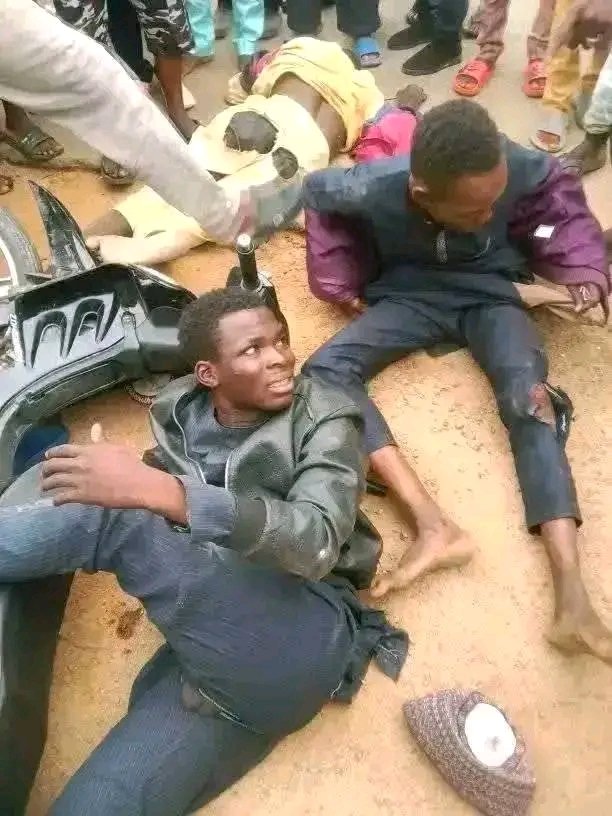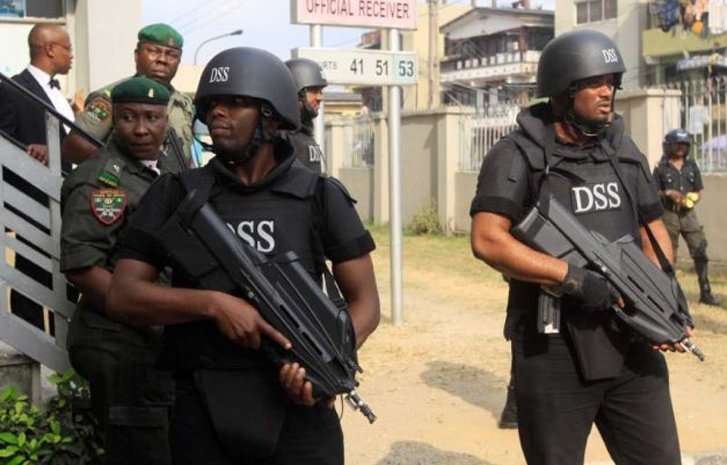
Police parade suspected phone snatchers arrested along Sultan Road, Kano.
KANO, Nigeria – Kano State is confronting a dangerous surge of drug-fuelled urban violence, where phone snatching has evolved from petty theft into a terrifying, life-threatening ordeal for residents.
Across neighbourhoods like Hotoro, Mariri, and Unguwa-Uku, victims carry physical scars and emotional trauma from attacks by gangs of young men, often high on drugs and armed with machetes or knives.
For many, fear now defines daily life. Commuters avoid certain streets after dark; parents warn children not to answer calls outdoors. Yet, amid the anxiety, communities are holding on — with a shared plea for decisive government action. Hussaini Ibrahim Kafi, writes.
“I Thought I Would Die There”: Survivor Recounts Night of Terror
Inuwa Adamu, a 36-year-old mechanic from Hotoro, vividly recalls a night he will never forget. He was ambushed while returning home from work near Mariri quarters, close to Larabar Mata Market — one of several victims in a brutal gang attack.
“Before I could react, more than twenty-five young men rushed out with knives and cutlasses,” he told AHR. “They surrounded us like a planned ambush. One stabbed me in the head. I fell bleeding, thinking I would die there.”
When he regained consciousness, his motorcycle, phone, and wallet were gone. “They took everything,” he said. “I still feel dizzy when I remember that night.”
Residents said similar attacks have swept through the city in recent weeks, spreading panic across once-busy streets.
“They Stabbed Me and Threw Me Out of the Tricycle”
Another victim, Muhammad Musa, from Unguwa-Uku in Tarauni Local Government Area, shared a similar ordeal.
“They came pretending to ask for directions,” Musa recalled. “Once I entered their tricycle, they brought out a knife and stabbed my hand. I lost consciousness and woke up on the roadside — they had taken my phone and money.”
He spent four days in the hospital recovering. “If the government doesn’t act fast,” he warned, “these boys will make Kano unliveable.”
Communities Speak Out: “Families Are Losing Control”
Traditional leader Alhaji Sani Maikudi from Gwale LGA said families are struggling to control their children.
“Every evening, residents fear sending children on errands,” he said. “These boys, high on drugs, attack without fear. They don’t just steal phones — they wound and sometimes kill.”
He blamed weak parental supervision, urging stronger community collaboration with law enforcement and traditional institutions to rehabilitate troubled youths.
Government’s Response: “We Are Attacking the Root Causes”
Kano State Commissioner for Information and Internal Affairs, Comrade Ibrahim Abdullahi Waiya, said the government has launched an aggressive campaign against phone snatching and drug abuse.
He explained that Governor Abba Kabir Yusuf’s administration set up a Joint Taskforce on Phone Snatching and Drug Abuse, alongside mobile courts for swift prosecution.
“We cannot rely on arrests alone,” Waiya told AHR. “We are targeting the root causes — drug abuse, unemployment, and youth frustration.”
Over 700 youths have reportedly been enrolled in the Operation Safe Corridor rehabilitation scheme at Kiru Reformatory Centre, where they receive counselling and vocational training before reintegration.
The Health Lens: “Drug Addiction Is Driving Violence”
Public health expert Dr. Kabiru Getso, a former commissioner, said most perpetrators act under the influence of drugs such as tramadol, codeine syrup, and crystal meth.
“These substances alter judgment and fuel recklessness,” he warned. “Without proper rehabilitation centres, arresting these youths will only recycle the problem.”
He called for closer integration of law enforcement and healthcare efforts to achieve sustainable results.
Police Crackdown: “Progress, But Vigilance Is Key”
Police spokesman, SP Abdullahi Haruna Kiyawa told AHR that the command has recorded major breakthroughs, recovering locally made weapons and arresting multiple suspects.

“Cooperation from residents has helped us act faster,” he said. “Most offenders operate under drug influence, which is why we are also working with NDLEA and community leaders.”
The Unfinished Battle
Despite progress, Kano’s phone snatching epidemic reveals a deeper crisis rooted in drug addiction, unemployment, and social neglect.
For victims like Inuwa and Muhammad, survival has come at a heavy emotional cost. But their message is clear: this is not just a fight for safety — it’s a struggle for the soul and future of Kano’s youth.




